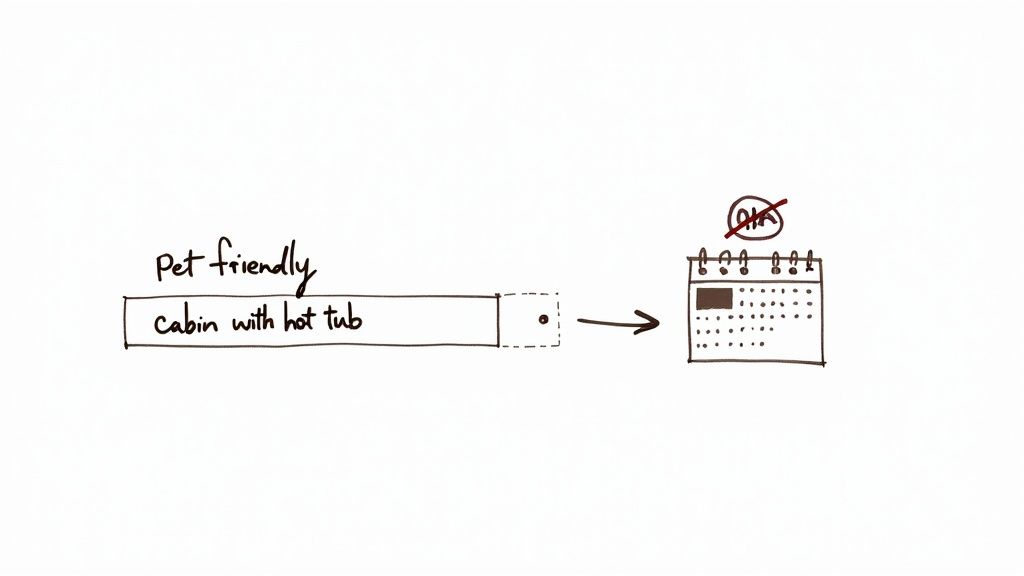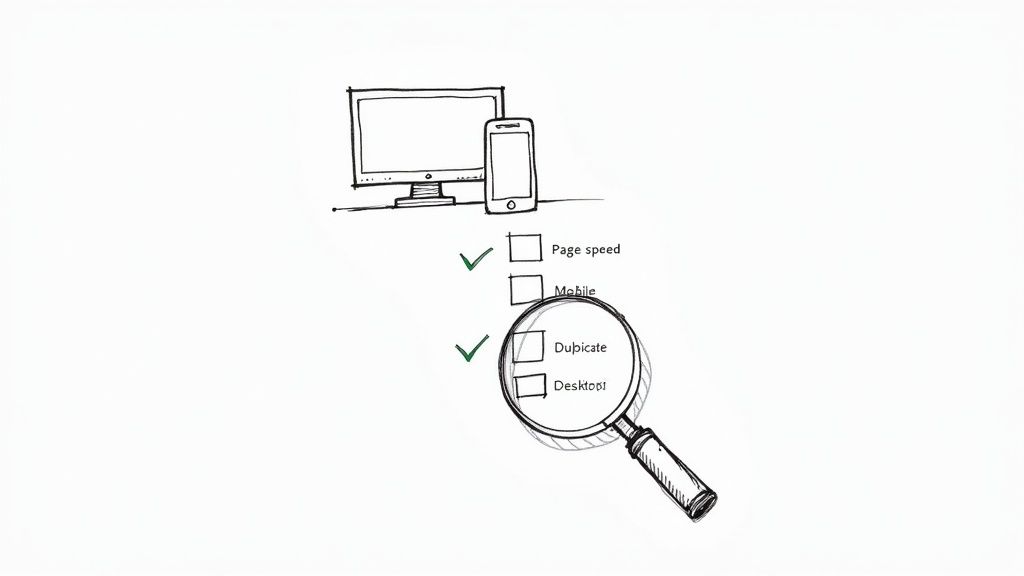
seo for vacation rentals
Boost Direct Bookings with seo for vacation rentals Today
Posted on Oct 27, 2025

If you’re a vacation rental manager, you’ve probably heard the term SEO thrown around. So, what is it, really? Put simply, SEO for vacation rentals is all about fine-tuning your direct booking website so it shows up higher on search engines like Google. The whole point is to get in front of high-intent travelers who are actively looking for a place to stay, which means you can rely less on the OTAs and see more direct revenue in your pocket.
Why SEO for Vacation Rentals Matters More Than Ever
Let’s be honest: the vacation rental market is flooded with OTA listings. Trying to stand out feels like a monumental task. When you’re only on platforms like Airbnb or Vrbo, you’re in a constant race to the bottom on price, all while paying out hefty commissions that eat away at your hard-earned profits.
This is where a solid SEO strategy becomes your most valuable player. It's not just about getting more clicks or visitors to your website; it’s about pulling in the right kind of traffic—the people who are packed and ready to book.

Driving High-Quality Leads Directly to You
Think for a minute about how people actually search for vacations these days. They've evolved past vague terms like "vacation rentals in Miami." Today’s travelers are specific, using long-tail keywords that signal they're serious about booking.
For instance, a potential guest isn’t just browsing—they’re searching for a "pet-friendly cabin with a hot tub near Asheville" or a specific "oceanfront condo in San Diego for a family of four."
When your website pops up for those exact searches, you’re connecting with guests who have already done their homework. They know what they want. These are high-quality leads, far more likely to convert than someone just window shopping. A smart approach to SEO for vacation rentals is how you capture this incredibly valuable audience. SEO is just one piece of the puzzle, and you can learn more about the full picture in our guide to short-term rental digital marketing.
Building a Long-Term Business Asset
Paid ads are great, but they have one major flaw: the moment you stop paying, they stop working. SEO is different. It’s an investment that builds a sustainable, long-term asset for your business.
Every blog post you write and every little optimization you make adds to your website's authority and visibility over time. It’s like planting a tree that grows stronger year after year.
SEO is the foundation for generating the majority of direct bookings. Guests searching on Google are highly motivated and ready to book, leading to much higher conversion rates compared to visitors from social media or email.
This consistent organic traffic creates a predictable stream of bookings, leading to a much more stable and profitable business. If you're ready to build that foundation, it helps to start with a clear understanding of what is SEO and how it works in detail.
Auditing Your Website for Hidden SEO Wins
Before you can even think about building an SEO strategy that pulls in direct bookings, you need to know exactly where you stand. A thorough website audit is your roadmap—it shows you what’s working, what's broken, and where the real opportunities are hiding. This isn't about getting bogged down in technical nonsense; it's a practical health check for your most important asset.
Think of it like a pre-flight check for your business. You wouldn’t take off without making sure everything is in order, right? The same logic applies here. An audit helps you find and prioritize the fixes that will actually move the needle on your rankings and, ultimately, your revenue.
Starting Your Technical SEO Checkup
First things first, let's look under the hood at your site's technical foundation. Two of the most critical factors right now are page speed and mobile-friendliness. With most travelers glued to their phones, a slow or awkward mobile site is a surefire way to lose a booking before they’ve even seen your best photos.
You can use free tools like Google's PageSpeed Insights to see how your site stacks up. Don't underestimate the impact of small tweaks. I once worked with a property manager who saw a 40% jump in organic traffic just by fixing a handful of mobile usability problems and rewriting some stale, boring title tags on their property pages.
Next, you absolutely have to get comfortable with your Google Search Console account. This free tool is a goldmine of direct-from-Google data on your site's health. It’s non-negotiable for serious SEO.
Inside, you can:
- Check for indexing errors: Find out if Google is struggling to crawl or understand your pages.
- Analyze mobile usability: Pinpoint specific pages that are failing on mobile and get tips on how to fix them.
- Review your backlink profile: See who is linking to your website (a key ranking factor).
This dashboard from Google Analytics, for example, gives you a clear picture of where your traffic is actually coming from.

Understanding whether your visitors are coming from organic search, direct links, or referrals is crucial. It tells you exactly where to focus your energy.
A quick look at your traffic sources in a tool like Google Analytics can tell a powerful story about what's working and what isn't.
Comparing Your Traffic Sources
| Channel | Average Conversion Rate | Typical Booking Intent |
|---|---|---|
| Organic Search | 2-4% | Very High |
| Paid Search | 2-3% | High |
| Direct | 3-5% | Very High (Often returning visitors) |
| Referral | 1-2% | Varies |
| Social Media | <1% | Low (Discovery phase) |
| 3-6% | High (Nurtured audience) |
This table makes it clear: traffic from search engines (organic and paid) comes with a much higher intent to book compared to someone casually scrolling through social media. They're actively looking for a place like yours.
Uncovering Content and On-Page Issues
Beyond the technical stuff, your audit has to get into the weeds of your actual content. Are your property descriptions unique and compelling, or are they just copied and pasted across listings? That's a huge red flag for Google. Another common mistake I see is unoptimized images with generic filenames like "IMG_1234.jpg"—a completely missed opportunity to tell search engines what the photo is about.
A well-defined SEO strategy is the engine for direct bookings. Guests searching on Google are highly motivated and ready to book, leading to much higher conversion rates than traffic from social media or email.
This is why an audit is so foundational. It helps you find and fix the very things that are stopping these motivated travelers from finding you in the first place. You can learn more about how these elements fit together from the vacation rental SEO strategies on buildupbookings.com. Skipping this step means you’re letting highly qualified guests slip through your fingers and book with someone else.
Finding the Keywords Real Guests Are Using
Great SEO always starts with getting inside your ideal guest’s head. What are the actual words and phrases they’re typing into Google when they’re serious about booking a stay? Forget generic terms like "beach house" for a moment. The real gold is in the details.
We're talking about long-tail keywords. These are the longer, more specific phrases that signal a searcher is ready to book, not just browse. Someone searching for a "pet-friendly cabin with hot tub near Asheville" isn't just daydreaming—they probably have their credit card in hand. Capturing this kind of high-intent traffic is the heart of a winning SEO strategy for vacation rentals.
Thinking Like a Traveler
First things first, let's brainstorm. Think about the unique character of your properties and the guests you love to host. Are your places perfect for families with young kids? Romantic escapes for couples? Or maybe you cater to digital nomads looking for a workcation.
What makes your properties stand out?
- For a family-focused rental: You might target phrases like "kid-friendly condo with pool" or "vacation home near Disney World for 6."
- For a romantic getaway: Think along the lines of "secluded cabin for two with fireplace" or "downtown loft for long weekends."
- For a unique property: Zero in on what makes it special with searches like "oceanfront rental with private pool" or "A-frame cabin in the mountains."
This isn't just a guessing game. It's about connecting the unique features of your inventory with the real-world desires of travelers. This list becomes your foundation before you even open a keyword tool.
Using Data to Find Keyword Gold
With your brainstormed list in hand, it's time to see what the data says. This is where tools like Ahrefs, SEMrush, or even the free Google Keyword Planner come into play. They'll show you exactly how many people are searching for your target phrases and how competitive those keywords are.
Here’s a look at Ahrefs' Keyword Explorer analyzing a term like "pet friendly vacation rentals."
This data is crucial. It gives you hard numbers on monthly search volume and keyword difficulty, helping you decide which terms are worth your time and effort.
The vacation rental market is buzzing, and understanding what travelers want is everything. To give you a better idea of what's driving searches right now, let's look at some key trends.
Top Vacation Rental Search Trends
Here's a snapshot of what modern travelers are looking for, broken down by different segments and property features. This data directly influences the keywords you should be targeting.
| Traveler Segment or Property Type | Market Share or Growth |
|---|---|
| Family Travelers | 40% of bookings |
| Travelers Prioritizing Kitchens | 64% list this as a top amenity |
| Pet-Friendly Rentals | 31% of travelers want to bring their pets |
| Online Bookings | 83% of all revenue comes from online channels |
These numbers aren't just trivia; they're a roadmap. They confirm just how vital it is to target keywords that match these specific, high-demand needs. Targeting "pet-friendly options" or highlighting your "fully-equipped kitchen" isn't just good marketing—it's smart SEO.
For a deeper dive into these trends, you can explore more vacation rental statistics on stayfi.com.
Optimizing Your Property Pages to Convert

This is where all your hard work on keyword research starts to pay off and turn into actual, direct bookings. On-page optimization is the art and science of setting up each property page to perfectly appeal to both Google and your ideal guest.
It’s all about making sure the right people find your listing and, once they do, feel an immediate, undeniable urge to book. The process really begins before a traveler even clicks on your site—it starts with your title tags and meta descriptions. These are the little snippets that pop up in Google's search results, acting as your digital welcome mat.
A generic title like "3 Bedroom Home" is a huge missed opportunity. It does nothing to stand out. Instead, something like “Oceanfront Villa in Malibu with Private Pool” is a masterclass in optimization. It instantly tells both Google and your potential guest exactly what you're offering, hitting specific features and a desirable location to attract people who are ready to book.
Weaving Keywords into Your Content
Once a guest clicks that link, your property description has to close the deal. This is absolutely not the place to just cram in keywords; Google is way too sophisticated for that old trick. The real goal is to write in a completely natural, compelling way while weaving in the phrases your guests are actively searching for.
For instance, if you discovered that travelers are searching for a "family-friendly cabin near hiking trails," then your description better highlight those exact features. Talk up the spacious bunk room perfect for the kids, and casually mention the trailhead that’s just a stone's throw from the front door.
This approach nails two critical goals at once:
- It clearly signals to search engines that your page is a top-tier result for those specific searches.
- It speaks directly to the desires of your target audience, making them feel like they've stumbled upon their perfect vacation spot.
Don't stop at the main description. Use headings (like H2s and H3s) to break up the text and spotlight key amenities. A heading like "Your Private Oasis with a Hot Tub" is so much more engaging than a boring "Features" list. This makes your page easier to read and gives search engines more context, which is a big boost for your seo for vacation rentals.
Don't just list amenities; sell the experience. A great property page answers a guest's questions before they even think to ask them and paints a crystal-clear picture of the amazing stay that awaits.
The Hidden Power of Image Optimization
We all know images sell vacation rentals, but they can also be your secret SEO weapon. Search engines can’t "see" your beautiful photos, so you have to give them clues using descriptive file names and alt text.
Instead of uploading a photo named IMG_5829.jpg, take a few seconds to rename it to something meaningful, like malibu-beach-house-patio-sunset-view.jpg. This simple action provides incredibly valuable keyword context to Google.
Likewise, the alt text (or alternative text) should describe the image for visually impaired users and, crucially, for search engines. Great alt text would be something like: "Patio view of the sunset over the ocean from our Malibu beach house."
This doesn't just help your photos show up in Google Images—a surprisingly good source of traffic—it also reinforces the overall on-page SEO of your property listing. Nailing these small details is one of the must-have features for a high-converting short-term rental website.
5. Use AI and Automation to Scale Your SEO
Growing your direct bookings with SEO doesn't mean you have to hire a massive marketing team. These days, AI and automation are the secret weapons for working smarter, not harder. They can take over the tedious, repetitive tasks, freeing you up to focus on the big-picture strategy and creating amazing guest experiences.

Just think about the time it takes to write unique, compelling descriptions for dozens—or even hundreds—of properties. It's a huge time sink. AI tools can now generate creative, keyword-rich descriptions in seconds, custom-fit to each property's specific features. This helps you avoid duplicate content penalties from Google while keeping a consistent and engaging brand voice across your entire portfolio.
Put Repetitive SEO Tasks on Autopilot
Beyond just writing content, you can put key parts of your SEO strategy on autopilot. Instead of spending hours manually checking where you rank for "oceanfront cabin with hot tub," you can use tools that monitor your keyword positions for you and just send you the report.
Here are a few great candidates for automation:
- Rank Tracking: Get daily or weekly updates on your most important keywords without lifting a finger.
- Competitor Analysis: Automatically keep an eye on what your competition is up to, from their latest blog posts to where they're getting backlinks.
- Content Scheduling: Set your local guides and blog articles to publish at the best times for engagement, all scheduled in advance.
If you want to go deeper on adapting your SEO for the new world of AI, this practical guide to SEO for AI is a fantastic resource with insights to keep you ahead of the curve.
By integrating technology, vacation rental operators can significantly boost performance. Smart strategies are no longer a luxury—they are a core component of a successful direct booking strategy.
The results of this approach speak for themselves. Recent data shows that 40% of hosts who adopted data-driven strategies saw an increase in both occupancy and their average daily rates. This growth was often powered by technology, with 37.5% of operators reporting a jump in direct bookings after improving their direct channel efforts, including SEO.
Automating these routine tasks frees you up to think strategically. To see how this applies to more than just SEO, check out our complete walkthrough of how to use AI to automate your short-term rental business. It's a strategic shift that lets you scale your success with technology while still keeping the human touch that makes your properties special.
How to Track Your SEO Performance and Make Smart Adjustments
Let’s get one thing straight: SEO isn’t a slow cooker. You can't just set it and forget it, hoping for a delicious, booking-filled result months later. To make sure your hard work actually translates into more direct bookings, you have to keep a close eye on what’s happening.
Without tracking, you're flying blind. You’re just guessing what’s working, and that’s a surefire way to burn through your time and marketing budget on an seo for vacation rentals strategy that goes nowhere.
The good news? You don't need a PhD in data science or a complicated analytics setup. You can get started with the essentials, which are available for free in Google Search Console and Google Analytics. Think of these tools as your direct line of sight into how your website is actually performing out in the wild.
The Key Metrics That Actually Matter
Forget the vanity metrics that make you feel good but don't pay the bills. For a vacation rental business, you need to zero in on the handful of numbers that directly impact your bottom line.
- Organic Traffic: This is the big one. How many people are finding your website through a Google search? Seeing this number climb steadily is one of the clearest signs your SEO efforts are paying off.
- Keyword Rankings: Are you showing up for the searches that matter? Track your top 10-15 most important keywords—think "oceanfront condo in San Diego" or "pet-friendly cabin near Asheville"—to see if you're moving up the ranks.
- Click-Through Rate (CTR): This tells you what percentage of people who see your site in the search results actually click on it. A low CTR is a major red flag that your page titles and meta descriptions aren't enticing enough to earn the click.
- Conversion Rate: This is the ultimate measure of success. Of all the visitors who land on your site from an organic search, what percentage actually completes a booking? This is where SEO turns into real revenue.
You can't improve what you don't measure. Dipping into your data regularly helps you spot trends, fix small issues before they snowball, and double down on the strategies that are putting heads in beds.
Let’s say you notice one of your property pages has a really high bounce rate—meaning people are clicking on it and then leaving almost immediately. That’s a signal to start digging. Are the photos grainy? Is the booking calendar confusing? Maybe the page is just taking forever to load on a smartphone.
Making these kinds of data-driven adjustments is what turns SEO from a guessing game into a predictable engine for growth. Check your analytics, see what's working (and what's not), and refine your approach. This constant loop of tracking, tweaking, and improving is what separates the vacation rental websites that thrive from those that get lost in the noise.
Got Questions About Vacation Rental SEO? We've Got Answers.
It’s totally normal to have a ton of questions when you first dive into the world of SEO. Let's tackle some of the most common ones we hear from property managers, so you can move forward with a clear game plan.
How Long Does It Take to See SEO Results?
Ah, the million-dollar question. The honest answer? It depends. SEO isn’t a magic wand you can wave for instant bookings; it’s more like planting a garden. You're building a valuable, long-term asset, not just running a quick ad.
Generally, you’ll start to see some movement in your keyword rankings and maybe a small bump in organic traffic within 3 to 6 months. But to get to the good stuff—significant, revenue-generating results, especially in a competitive area—you're likely looking at 6 to 12 months of consistent work. It takes time to build those strong roots before you can enjoy the fruits of your labor.
Should I Focus on My Website or My OTA Listings?
Your direct booking website should be your number one priority for vacation rental SEO. Full stop.
While you shouldn't completely ignore your listings on Airbnb or Vrbo, think of them as billboards on someone else's highway. Your own website is the only piece of online real estate you truly own. It’s where you build your brand, collect guest info for future marketing, and—most importantly—bring in those sweet, commission-free bookings.
Use your OTA listings to get in front of eyeballs, but your website is the main event. Every bit of SEO effort should be aimed at driving traffic to the platform you control, turning OTA browsers into direct bookers.
How Can I Compete with Big Brands?
You don’t need a massive budget to go toe-to-toe with the big guys. Your secret weapon is your local expertise. The big brands often rely on generic, one-size-fits-all content that feels sterile and impersonal. You can win by getting hyper-local.
- Become the go-to local guide: Write about the best hidden coffee shops, the hiking trail only locals know about, or the best restaurants for a family dinner. Be the expert.
- Target long-tail keywords: Don't just go after "Miami vacation rental." Get specific. Aim for "pet-friendly South Beach condo for couples" or "downtown Austin loft for a bachelorette weekend." These searches are less competitive and attract guests who are much closer to making a decision.
- Show off your unique features: Does your place have a private hot tub or an EV charger? Optimize for those! People search for specific amenities all the time.
By being more authentic and specific, you carve out a niche where the big players simply can't compete. This targeted approach is your key to winning at SEO as a smaller vacation rental business.
Ready to stop relying on OTAs and start driving commission-free bookings? hostAI provides the AI-powered tools you need to create a high-converting website, automate your marketing, and scale your SEO efforts. See how leading STR managers are doubling their direct revenue. Learn more about hostAI.